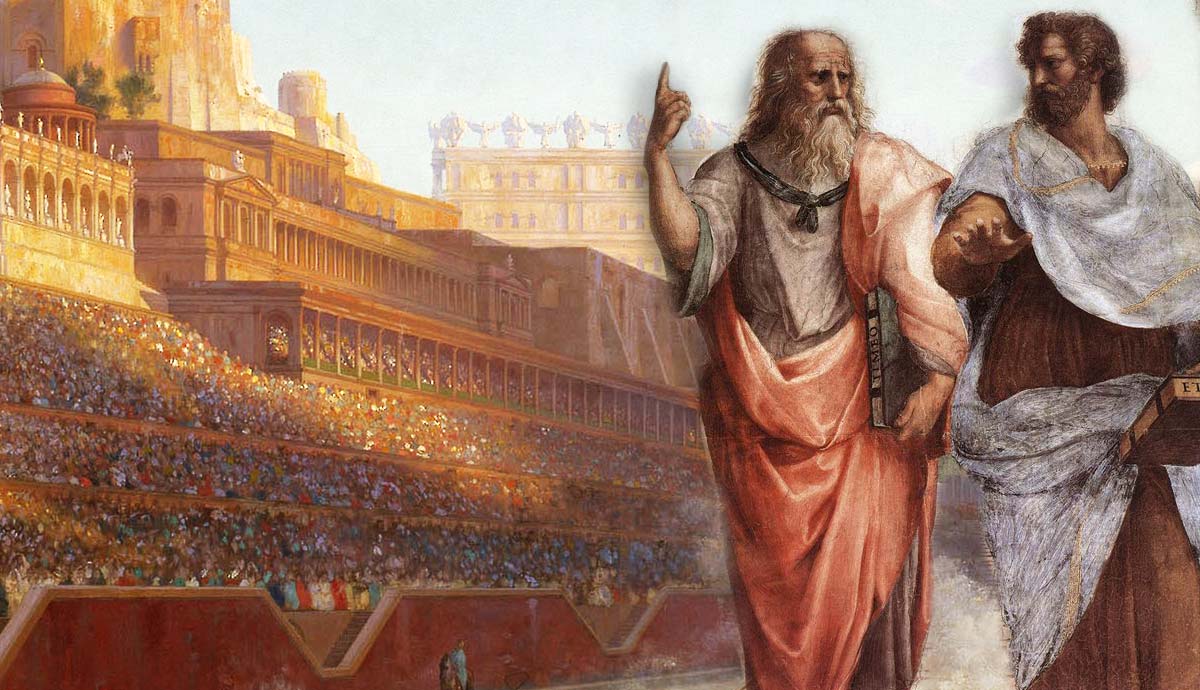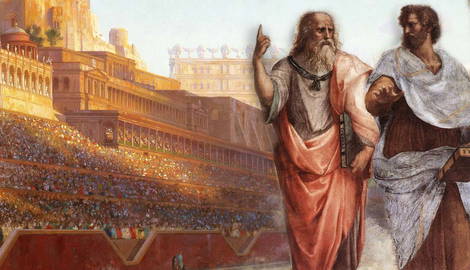
Plato’s legacy stands at par with his mentor Socrates and his most famous pupil Aristotle. Having witnessed the execution of Socrates at the hands of the Athenian state, Plato became a loud critic of the political landscape of his time. The school of his philosophy fits neatly into what has come to be known as idealism – ideas based on ethereal, other-worldly ideals. Rafael represents Platonic ideals in his above work The School of Athens via Plato, on the left, gesturing upwards. If Plato thought in terms of ideals, what did Plato’s ideal Republic look like – after he suffered at the hands of his actual government?
Ideals in Plato’s Republic

In Plato’s time, the Athenians saw themselves as the stewards of Greek culture and influence. Many Athenians held themselves as superior to other surrounding Greek-speaking city-states simply because of their social structure and political organization. In Platonic terms, Athens saw itself as the ideal Greek state.
Even prior to the execution of his mentor, Plato saw through the cracks of the Athenian political facade. Much of Plato’s output criticized the structure of the Athenian society, which in turn was directed as the structure of their politics – at the time one of the most advanced in the world.
Central to his critique was the absence of a place in society for the educated. Plato believed that those who naturally dominate society should be those who are learned; philosophers themselves were central to Plato’s ideal social structure. This ideal ruler was dubbed the Philosopher King; in Plato’s mind, the right to rule ought to be exclusive to philosophers – they are a facet of society above everybody else.
Philosopher Kings were defined as those with a thirst for knowledge: a trait instilled in Plato himself by his mentor Socrates. The Athenian state, evidently, viewed philosophers as a social nuisance. Those who roamed around and loudly questioned authority or interrogated political figures – exactly the role Socrates played as depicted by Plato – were a thorn in the side of the administration.
Plato and the Philosopher King

In addition to being a 90s Canadian pop band, the Philosopher King was Plato’s ideal vision of a political leader. Plato believed that this position should be reserved for the most curious, benevolent, just, kind, and altruistic in a society. In his mind, these were philosophers.
Philosophers prior to Socrates were simply those who sought to explain the inexplicable. Socratic curiosity and knowledge, or lack thereof, infiltrated Athenian society as the man roamed the streets questioning various figures of society. The main idea Socrates carried was that he knew, and assumed, nothing; he simply held a line of questioning to assorted figures and used their own assertions against them to poke holes in their own logic.
This led to the birth of Western Philosophy and instilled in Plato a deep and profound love for curiosity and wonder. This love was unique to a philosopher, and therefore places them in a distinct social class – the only one fit to rule.
Roman Emperor Marcus Aurelius later exemplified this idea. His quiet and thoughtful introspection (being a philosopher in the school of Stoicism himself) offers evidence of prosperity of society under a Philosopher King.
Beyond the Philosopher King at the top, the rest of society would ideally be made up of producers at the bottom, and auxiliaries (or soldiers) in the middle. But what dictates the organization of these three social classes?
Plato and the Tripartite Platonic Soul

The effectiveness (and danger) of Plato’s writing comes from his ability to conjure and create mythical stories to justify his rhetoric. In fact, the myth of the lost city of Atlantis was mentioned by Plato as means to prove his point on hubris.
Plato justifies his quasi-fascistic outlook of society by arguing that it reflects nature. The claim is that the human soul – a topic with which ancient Greek thinkers were infatuated – is also divided into three parts. Plato’s Chariot Allegory holds that all human beings are represented by a charioteer and two horses. The charioteer himself represents human reason; one horse represents rational capacity (equated to the human mind) while the other horse represents our irrational capacity fueled by desire and pleasure (equated to the body). The state and the soul stand in perfect analogy.
Philosopher Kings are firmly in control of their chariot, and perfectly balance the two horses to achieve enlightenment. The myth fabricated by Plato is that these individuals are born with gold in their souls and should therefore hold an elite space in society. This caste represents the virtues of reason and justice.
The auxiliaries (or soldiers), Plato’s following social caste, are to serve, protect, and keep order about society. Soldiers represent the virtues of discipline, and Plato’s mythical justification is silver rooted within their souls.
At the bottom of the Platonic caste system are producers. They represent members of society such as farmers and those who create materials needed for comfort and pleasure within a society. These people service predominantly their irrational capacity and insatiable desire for pleasure and comfort. Ideally, the virtue of this caste would be moderation – an idea furthered by Aristotle.
The Republic

Plato’s most well-known written work is The Republic. Like all his works, The Republic is constructed as a dialogue consisting of several characters. Plato implements the character of his mentor Socrates as his mouthpiece for his philosophical inquiry. The art, skill, and danger of Plato’s writing lies here; as each character represents different facets of philosophy, Plato can manipulate their ideas to distort his own.
The main theme of the work is justice – the question of how integral a part of society it is. Plato, through his mouthpiece Socrates, discusses the notion of justice with various members of Athenian society.
Among many other arguments, conversations, and themes, in Plato’s Republic he arrives at the discussion of the Philosopher King. As stated, the idea here is that the Philosopher King is the most virtuous and just of a society. Plato claims that these virtues are often honed through education.
The character of Socrates goes on to outline different political systems and offers critiques of them all (including democracy). Plato argues that a state cycles through all political systems until it finally arrives at tyranny – the worst of all.
The virtues of the Philosopher King naturally prevent the decay of society, seeing as they are benevolent and just. They defend society from the dominance of an aristocracy, keep the balance between the elite and the majority from tipping to a democracy – a bad thing according to Plato – and rid society of corrupt demagogues with honeyed political words.
Plato’s Republic and the Kallipolis

Remember when I said how good Plato was at implementing storytelling and mythology in his rhetoric? The mythical city of Kallipolis (which is, literally, Greek for “good city”) was the canvas on which Plato projected his ideas.
Kallipolis was Plato’s idea of a utopian society, purged of all evil and vices; a well-oiled political machine that functions perfectly to sustain itself and strive towards peace and prosperity. Platonic society is evidently governed by highly learned Philosopher Kings – each educated from birth for fifty years prior to taking control of Kallipolis.
Society is divided into Plato’s strict caste system in which there is no internal room for movement or transition. Children, upon being born, immediately become the possession of the state and not the family. Children of weaker genetics or stature would be “removed” by the state – this was practiced by the ancient Spartans to keep their populace as physically elite as possible.
Censorship of the arts are enforced; this is justified by Plato’s ability of storytelling and myth connecting – the state approves one truth, and it is to be the only acceptable truth. Plato saw the arts as means of distorting rhetoric and sensationalizing public affairs, therefore he kept no place for it in Kallipolis.
Kallipolis is often depicted in art as the Tower of Babel. The story of the Tower alleges that at one time all humans could speak the same language. This facilitated conversation, cooperation, and social advancement – manifested in the construction of a massive tower. God, seeing the tower as a challenge to His authority, destroyed it and split the world and the people on it into many smaller cultures and languages. It is a lesson on hubris and humility.
Plato’s Republic and His Ideals

In simple terms, Plato favored a heavily structured society in which the state possessed immense totalitarian power and control over the populace. This was justified in that the ruler, the Philosopher King, spends most of his life preparing to govern such a society.
Plato’s ideals for society have been both supported and refuted over the years. His concepts of the one (state sponsored) universal truth, his criticism of the arts, critique of democracy, and heavily segregated ideal social structure are among the most commented proposals he crafted.
Whether one agrees with his ideals or not, Plato influenced an immense number of philosophers in his wake. Would you like to live in Kallipolis?










